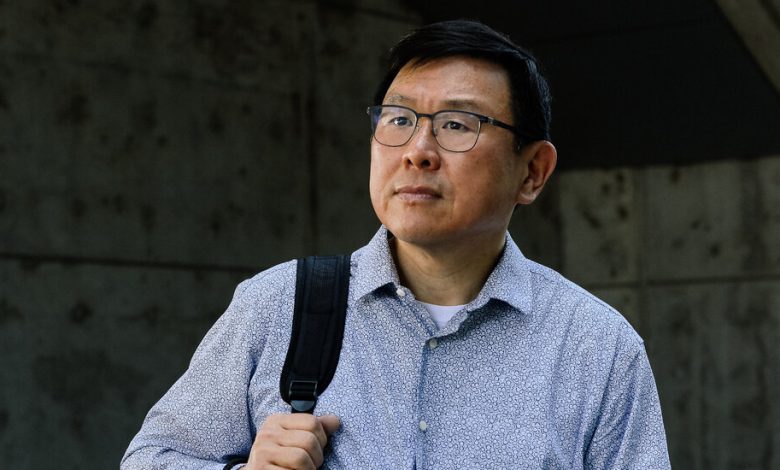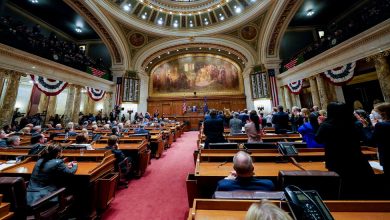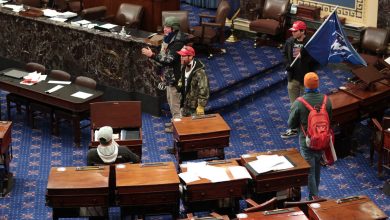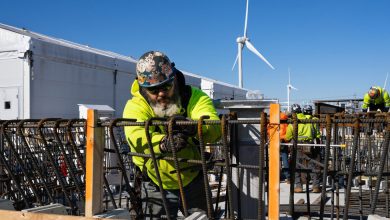Canadian Politicians Who Criticize China Become Its Targets

The polls predicted a re-election victory, maybe even a landslide.
But a couple of weeks before the vote, Kenny Chiu, a member of Canada’s Parliament and a critic of China’s human rights record, was panicking. Something had flipped among the ethnic Chinese voters in his British Columbia district.
“Initially, they were supportive,” he said. “And all of a sudden, they just vanished, vaporized, disappeared.”
Longtime supporters originally from mainland China were not returning his calls. Volunteers reported icy greetings at formerly friendly homes. Chinese-language news outlets stopped covering him. And he was facing an onslaught of attacks — from untraceable sources — on the local community’s most popular social networking app, the Chinese-owned WeChat.
The sudden collapse of Mr. Chiu’s campaign — in the last federal election, in 2021 — is now drawing renewed scrutiny amid mounting evidence of China’s interference in Canadian politics.
Mr. Chiu and several other elected officials critical of Beijing were targets of a Chinese state that has increasingly exerted its influence over Chinese diaspora communities worldwide as part of an aggressive campaign to expand its global reach, according to current and former elected officials, Canadian intelligence officials and experts on Chinese state disinformation campaigns.
Canada recently expelled a Chinese diplomat accused of conspiring to intimidate a lawmaker from the Toronto area, Michael Chong, after he successfully led efforts in Parliament to label China’s treatment of its Uyghur Muslim community a genocide. Canada’s intelligence agency has warned at least a half-dozen current and former elected officials that they have been targeted by Beijing, including Jenny Kwan, a lawmaker from Vancouver and a critic of Beijing’s policies in Hong Kong.

After Jenny Kwan, a member of Parliament, began speaking out against Beijing’s crackdown in Hong Kong and its treatment of the Uyghurs, invitations from some organizations dried up.Credit…Alana Paterson for The New York Times
The Chinese government, employing a global playbook, disproportionately focused on Chinese Canadian elected officials representing districts in and around Vancouver and Toronto, experts say. It has leveraged large diaspora populations with family and business ties to China and ensuring that the levers of power in those communities are on its side, according to elected officials, Canadian intelligence officials and experts on Chinese disinformation.
“Under Xi Jinping’s leadership, China has doubled down on this assertive nationalist policy toward the diaspora,” said Feng Chongyi, a historian and an associate professor at the University of Technology Sydney. China’s role in Canada mirrored what has happened in Australia, he added.
Chinese state interference and its threat to Canada’s democracy have become national issues after an extraordinary series of leaks in recent months of intelligence reports to The Globe and Mail newspaper by a national security official who said that government officials were not taking the threat seriously enough.
Prime Minister Justin Trudeau, who has been criticized for not doing enough to combat reported interference by China, is under increasing pressure to call for a public inquiry.
Current and former elected officials interviewed by national security agents said some of the intelligence appeared to stem from wiretaps of Chinese diplomats based in Canada. The Globe has said that it has based its reporting on secret and top-secret intelligence reports it has viewed.
In Vancouver and two surrounding cities — Richmond and Burnaby — that are home to Canada’s largest concentration of ethnic Chinese, the reach of the Chinese Consulate and its allies has grown along with waves of immigrants from China, said longtime Chinese Canadian activists and politicians.
The Chinese Benevolent Association, or C.B.A. — one of Vancouver’s oldest and most influential civic organizations — was a longtime supporter of Taiwan until it turned pro-Beijing in the 1980s. But it has recently become a cheerleader of some of Beijing’s most controversial policies, placing ads in Chinese-language newspapers to support the 2020 imposition of a sweeping national security law that cracked down on basic freedoms in Hong Kong.
The association and the Chinese Consulate publicize close ties on their websites.
A former president of the C.B.A., Hilbert Yiu, denied that the organization had any official ties to Chinese authorities, but acknowledged that the association tended to support China’s policies, arguing that Beijing’s human rights record was “a lot better” than in the past.
Mr. Yiu, who remains on the C.B.A.’s board, said stories of Chinese state interference in Canadian politics were spread by losing candidates.
“I think it doesn’t exist,” Mr. Yiu said, adding instead that Western nations were afraid of “China being strong.”
Mr. Yiu, who as a host on a local Chinese-language radio station also pushes pro-Beijing views, was an overseas delegate in 2017 to the Chinese People’s Political Consultative Conference, an advisory body to the Chinese government that Beijing uses to win over and reward supporters who are not members of the Communist Party.
The leaders of the C.B.A. — whose opinions hold sway, especially among immigrants not fully comfortable in English — say their organization is politically neutral.
But in recent years, it and other ethnic Chinese organizations have excluded politicians critical of Beijing from events, including Ms. Kwan, the Vancouver lawmaker. A member of the left-leaning New Democratic Party, Ms. Kwan has represented, first as a provincial legislator and then at the federal level, a Vancouver district that includes Chinatown since 1996.
But after Ms. Kwan began speaking out in 2019 against Beijing’s crackdown in Hong Kong and its treatment of the Uyghurs, invitations dried up — including to events in her district, like a Lunar New Year celebration.
“Inviting the local member of Parliament is standard protocol,” Ms. Kwan said. “But in instances where I’ve not been invited to attend — whether or not that’s related to foreign interference are questions that I have.”
Fred Kwok, another former C.B.A. president, said Ms. Kwan was not invited to the Lunar New Year celebration because the coronavirus pandemic forced organizers to hold the event virtually and there was “limited time.”
Later that year, a couple of months before the federal election, Mr. Kwok held a luncheon for 100 people at a well-known seafood restaurant in Chinatown to support Ms. Kwan’s rival. Mr. Kwok said he was acting on his own behalf and not as the C.B.A.’s leader.
Richard Lee, a councilor in Burnaby and a former provincial legislator, faced far worse.
Mr. Lee, who immigrated to Canada from China in 1997, and was elected in 2001 to the provincial legislature, became known for supporting local businesses and never missing ribbon-cutting events. He also faithfully attended an annual commemoration of the massacre of pro-democracy demonstrators in Tiananmen Square in 1989.
It was once a low-key event, but with Mr. Xi in power, many participants started wearing masks to hide their identities, fearing reprisals from Beijing.
Mr. Lee’s attendance became an issue at a barbecue party in the summer of 2015 when he said that the consul general at the time, Liu Fei, asked him, “Why do you keep attending those events?”
Later, in November, Mr. Lee and his wife, Anne, flew to Shanghai. At the airport, he said he was separated from his wife and detained for seven hours while the authorities searched his personal cellphone and a government-issued Blackberry.
He asked why and said he was told: “‘You know what you have done. We believe you could endanger our national security.’”
He and his wife were put on a plane back to Canada.
In Burnaby, the political climate shifted. He was no longer invited to some events because organizers told him that the consul general did not want to attend if Mr. Lee was also present. Longtime supporters started keeping their distance. Mr. Lee said he believed the icy treatment contributed to the loss of his seat in 2017, after 16 years in office.
A spokesman for the Chinese Embassy in Ottawa did not reply to questions about the consulate’s alleged actions in Vancouver, saying only that “China never interferes in other countries’ internal affairs” and that accusations of interference were an “out-and-out smear of China.”
But China’s former consul general in Vancouver, Tong Xiaoling, boasted in 2021, according to The Globe, about helping defeat two Conservative lawmakers, including one she described as a “vocal distractor” of the Chinese government: Kenny Chiu.
After arriving from Hong Kong in 1992, Mr. Chiu settled in Richmond, where more than half of the population of 208,000 is made up of ethnic Chinese. He was elected to Parliament in 2019 as a Conservative.
Mr. Chiu, 58, quickly touched on two issues that appeared to put him in the cross hairs of Beijing and its local supporters: criticizing Beijing’s crackdown in Hong Kong and proposing a bill to create a registry of foreign agents, inspired by one established by Australia in 2018.
The anonymous attacks against him on Chinese social media amplified criticism of the bill among some Canadians that it would unfairly single out Chinese Canadians.
A month before the federal election in September 2021, the polls instilled confidence in Mr. Chiu’s campaign staff.
But in the final 10 days, Mr. Chiu relayed growing concerns to his campaign manager, Jordan Wood: cooling response from ethnic Chinese voters and increasingly hostile and personal anonymous attacks. The attacks, which were going viral on WeChat, painted his bill as a racist assault on Chinese Canadians and Mr. Chiu as a traitor to his community.
Mr. Wood recalled a frantic late-night call from Mr. Chiu after a searing meeting with Chinese Canadian voters.
“‘Our community is more polite than this,’” Mr. Wood recalled Mr. Chiu telling him. “Even if you don’t like someone, you don’t go after them in this way. This was a level of rudeness and attack beyond what we would expect.”
The attacks on WeChat drew the attention of experts on disinformation campaigns by China and its proxies.
The attacks were driven by countless, untraceable human and artificial intelligence bots, said Benjamin Fung, a cybersecurity expert and a professor at McGill University in Montreal.
Their proliferation made them especially effective because ethnic Chinese voters depend on WeChat to communicate, said Mr. Fung, who assessed Mr. Chiu’s case shortly after the vote.
Less than a week before the vote, a Canadian internet watchdog, DisinfoWatch, noted the attacks against Mr. Chiu on WeChat.
“My assumption was that this was a coordinated campaign,” said Charles Burton, a former Canadian diplomat in Beijing and senior fellow at an Ottawa-based research group behind DisinfoWatch.
Mr. Chiu made last-ditch efforts to save his campaign, including meeting a group of older people who echoed the attacks against him and his bill on WeChat.
“Why would I subjugate my grandchildren to generations of persecution and discrimination?” Mr. Chiu recalled being asked.
The next day, he saw social media photographs of the same people publicly backing his main rival from the Liberal Party, Parm Bains, the eventual winner. Mr. Bains declined to comment.
Mr. Chiu asked allies to reach out to local leaders who had suddenly dropped him, including prominent members of a Richmond-based umbrella group, the Canadian Alliance of Chinese Associations. Its leader, Kady Xue, did not respond to messages seeking comment.
Chak Au, a veteran city councilor nicknamed the “Chinese Mayor of Richmond” and a longtime ally of Mr. Chiu, pressed ethnic Chinese leaders about the sudden erosion of support.
“There was a kind of silence,” Mr. Au said. “Nobody wanted to talk about it.”
He added, “They didn’t want to create trouble.”





